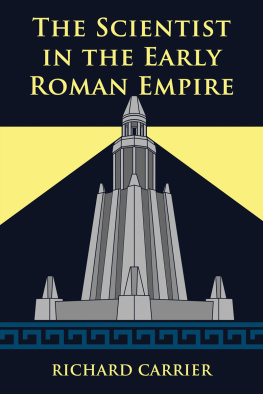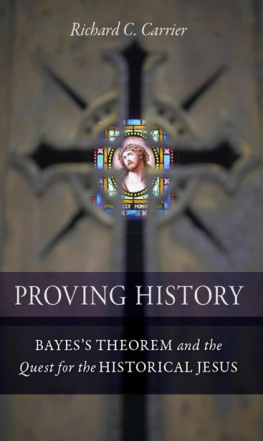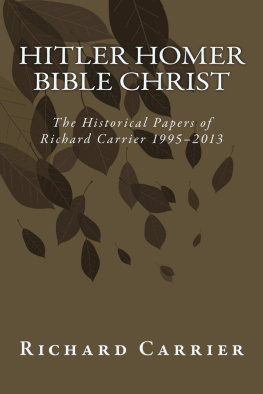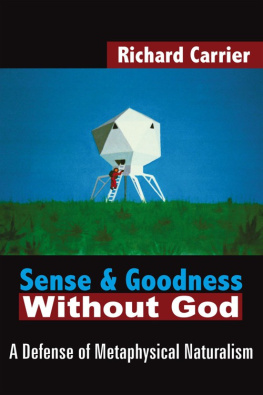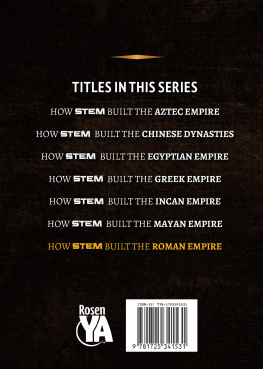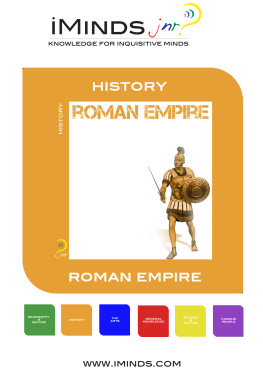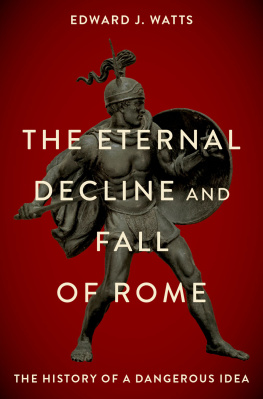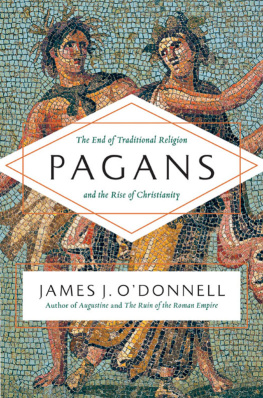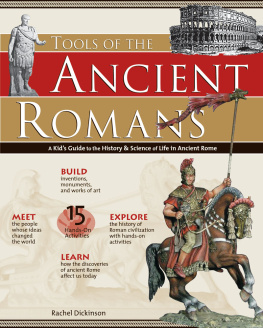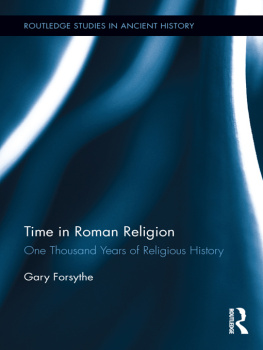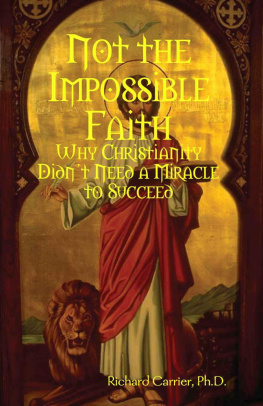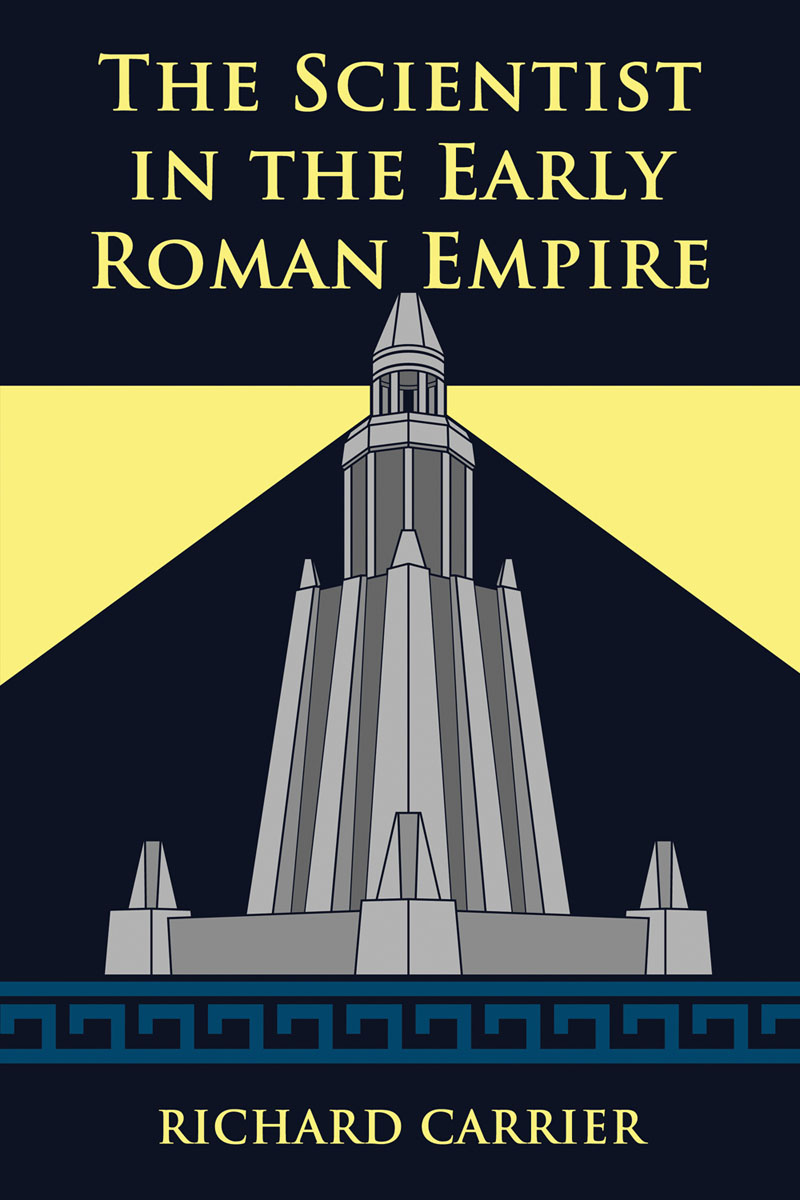
Pitchstone Publishing
Durham, North Carolina
www.pitchstonepublishing.com
Copyright 2017 by Richard Carrier
All rights reserved
Printed in the USA
10 9 8 7 6 5 4 3 2 1
Library of Congress Cataloging-in-Publication Data
Names: Carrier, Richard, 1969
Title: The scientist in the early Roman Empire / Richard Carrier.
Description: Durham, North Carolina : Pitchstone Publishing, [2017] | Includes bibliographical references and index.
Identifiers: LCCN 2016057375| ISBN 9781634311069 (pbk. : alk. paper) | ISBN 9781634311083 (epdf) | ISBN 9781634311090 (mobi)
Subjects: LCSH: Science, Ancient. | ScientistsEuropeHistoryTo 1500. | ScienceEuropeHistoryTo 1500. | SciencePhilosophyHistory. | Religion and scienceEuropeHistoryTo 1500. | RomeCivilization.
Classification: LCC Q124.95 .C3674 2017 | DDC 509.37dc23
LC record available at https://lccn.loc.gov/2016057375
C ONTENTS
1. I NTRODUCTION
The present study demonstrates that Christianity in its first three centuries was almost uniformly hostile or dismissive of the value of studying nature, while over the same period there was a significant contingent of influential pagans who embraced and expressed exactly the opposite attitude. Though there were also a variety of negative attitudes among the pagans at all levels of society, the early Christians shared nothing like the positive attitudes found among their pagan peers. The evidence for this includes not only straightforward surveys of direct and indirect expressions of Christian and pagan attitudes in extant literature, but also a survey of the actual and ideal status of science in Roman education (which I treated in a previous volume, Science Education in the Early Roman Empire), as well as the appreciation and expectation of scientific progress among Roman intellectuals. For context we will also survey what a natural philosopher was imagined to be and do, and how they are an ancient analog to the modern notion of a scientist. The present chapter introduces the issue by explaining why that question concerns us, and what my focus and methods shall be.
1.1 P ROBLEM
One of the outstanding questions in history is why the Scientific Revolution occurred so late in the history of civilization. The state of science and philosophy in Greco-Roman society was remarkably advanced, more so than most people realize. Such a level was not achieved anywhere else in So why did the ancients not experience a more sweeping revolution in the methods and social role of science, despite seeming to have all the right ingredients in place for almost a thousand years? Why did that revolution only finally happen over the course of the 17th century?
There are two kinds of answer one can give to this question. Either it is all just blind lucksuch a revolution could have happened in either era, but in the 17th century we just got lucky, the right individuals simply chanced upon the right discoveries at the right timeor certain necessary social-historical causes converged in the 17th century but not before. A third possibility would be some combination of both, which may be more probable.its zeitgeist was articulated (Francis Bacon, sometimes credited as a father of the Scientific Revolution, actually wrote fifty to a hundred years after a shift in the role and methods of science had already begun), yet happened so quickly (in less than two centuries the methodology and social role of science had radically changed, despite some resistance), and involved so many intellectuals converging on similar ideas all at once (many of whom had no direct contact with each other or with anyone we could call the match who lit the fire), that the most credible explanation must surely include at least some broad socio-historical causes. Something must have been different about 16th and 17th century European society.
One issue that often comes up in attempts to resolve this question is the social position of the scientist, who before the close of the Scientific Revolution was only known as one or another variety of philosopher. How respected and socially supported, or how marginalized or opposed, was this sort of person and their work? The present study provides the bulk of the answer to that question for the ancient period, particularly the last stretch of it, by which time any social, cultural, or ideological factors that would have converged to produce a scientific revolution should have had their effect. Whether the social position of the natural philosopher was actually different before or after the Renaissance is a question that must be left for future study. But some scholars insist there was a difference, and though their claims about the early modern period might also be questionable, only their claims about the ancient period will be thoroughly examined here.
In his broader survey of the historiography of the Scientific Revolution, H. Floris Cohen summarized past attempts at explaining why that revolution did not happen in the ancient world.
This same argument had previously been made by Ludwig Edelstein, who claimed that ancient society on the whole remained completely indifferent to the value of science, and that this lack of public support hindered scientific progress by ensuring only very few would pursue it. below), was to some extent marginalized in ancient society. However, this leaves open the question of how marginalized, and ultimately of whether there is any significant difference between sciences marginalization in antiquity and its social position immediately before the modern Scientific Revolution.
Though Lloyd and Edelstein make many correct observations about the social status of the natural philosopher in antiquity, these facts become problematic when turned into explanations. Certainly in antiquity there was no distinct social category of the scientist per se, but neither had there been in the 16th or early 17th centuriesthe creation of a distinct and recognized role for science and scientists was clearly a consequence and not
It is certainly true that the number of scientific investigators in antiquity was never large and their social position did vary among different social groups and periods, yet scientific knowledge and methodology continuously improved between 400 B.C. and 200 A.D. (from Aristotle and his predecessors to Ptolemy and Galen), as Lloyd himself admits.
How this relates to social perceptions of the natural philosopher is articulated in more detail by Joseph Ben-David, but his analysis is fraught with even greater problems. He claims that in antiquity scientists were regarded as philosophers interested in a particularly esoteric and impractical branch of knowledge. But he does not identify who thought this, even though there were many different segments of the population with different attitudes and influences. As we shall see in later chapters, Ben-Davids assertion does not hold up against considerable evidence to the contrary. Whatever the case, his overall theory is that ancient science never underwent a scientific revolution because it developed in a slow and irregular pattern due to the absence of the specialized role of the scientist and the nonacceptance of science as a social goal in its own right. But, he argues, in order to become accepted by others and perpetuated, people have to fulfill a recognized social function, and therefore:
Before science could become institutionalized, there had to emerge a view that scientific knowledge for its own sake was good for society in the same sense that moral philosophy was. Something like this idea had apparently occurred to some natural philosophers. But in order to convince others that this was so, they had to show some moral, religious, or magical relevance of their insights. As a result, the scientific content of natural philosophy was either lost or concealed by the superstitions and rituals of esoteric cults.
Next page
